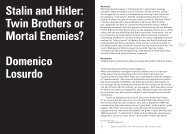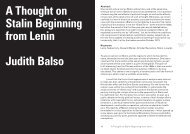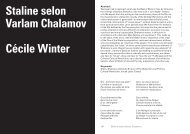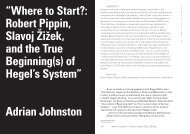Reflections on the Meaning of Stalinism Paul Le Blanc
blanc
blanc
You also want an ePaper? Increase the reach of your titles
YUMPU automatically turns print PDFs into web optimized ePapers that Google loves.
was an absolute scandal for <strong>the</strong> oppositi<strong>on</strong>s <strong>of</strong> 1924-28. 19<br />
Increasingly, fierce repressi<strong>on</strong> was employed against critics <strong>of</strong><br />
Stalin’s ideas and policies inside <strong>the</strong> Communist Party – in <strong>the</strong> name <strong>of</strong><br />
unity and discipline and <strong>Le</strong>ninist principles (although such inner-party<br />
brutality and authoritarianism had been alien to <strong>the</strong> revoluti<strong>on</strong>ary party<br />
that <strong>Le</strong>nin had led). 20 Ultimately, by <strong>the</strong> late 1930s, such repressi<strong>on</strong><br />
became murderous and was employed not <strong>on</strong>ly against old oppositi<strong>on</strong>ists,<br />
but also against many who had c<strong>on</strong>sistently sided with Stalin in <strong>the</strong><br />
debates <strong>of</strong> <strong>the</strong> 1920s. The repressi<strong>on</strong>, far from being <strong>the</strong> product <strong>of</strong> whims<br />
and paranoia emanating from an Evil Genius, flowed logically from a<br />
particular c<strong>on</strong>text.<br />
From his “commanding positi<strong>on</strong> in <strong>the</strong> party oligarchy,” Tucker<br />
recounts, Stalin aimed for what he saw as “a policy <strong>of</strong> revoluti<strong>on</strong>ary<br />
advance in <strong>the</strong> c<strong>on</strong>structi<strong>on</strong> <strong>of</strong> socialism, for which speedy<br />
collectivizati<strong>on</strong> <strong>of</strong> <strong>the</strong> peasants was a necessity. He <strong>the</strong>reby steered <strong>the</strong><br />
state into <strong>the</strong> revoluti<strong>on</strong> from above.” The impact <strong>of</strong> this state-imposed<br />
“revoluti<strong>on</strong>” was not anticipated by many Communists. “So habituated<br />
was <strong>the</strong> collective party mind to <strong>the</strong> idea that building socialism would be<br />
an evoluti<strong>on</strong>ary process,” explains Tucker, “that Stalin’s party colleagues<br />
apparently did not divine what <strong>the</strong> apostle <strong>of</strong> socialism in <strong>on</strong>e country<br />
was saying” when he first hinted at what he had in mind in 1926. It was<br />
certainly alien to <strong>Le</strong>nin’s orientati<strong>on</strong>. It c<strong>on</strong>stituted nothing less than a<br />
brutal and violent impositi<strong>on</strong> <strong>of</strong> government policies against and at <strong>the</strong><br />
expense <strong>of</strong> <strong>the</strong> working class and <strong>the</strong> peasantry. 21<br />
From 1928 through <strong>the</strong> 1930s, Stalin’s “revoluti<strong>on</strong> from above”<br />
pushed through <strong>the</strong> forced collectivizati<strong>on</strong> <strong>of</strong> land and a rapid<br />
industrializati<strong>on</strong> that remorselessly squeezed <strong>the</strong> working class, choked<br />
intellectual and cultural life, killed milli<strong>on</strong>s <strong>of</strong> peasants, culminating in<br />
purge trials, mass executi<strong>on</strong>s, and a ghastly network <strong>of</strong> pris<strong>on</strong> camps (<strong>the</strong><br />
infamous Gulag) brutally exploiting its victims’ labor.<br />
There was a method in <strong>the</strong> madness. What Marx called primitive<br />
capitalist accumulati<strong>on</strong> – involving massively inhumane means (which<br />
included <strong>the</strong> slave trade and genocide against native peoples, as well<br />
as destroying <strong>the</strong> livelihood <strong>of</strong> milli<strong>on</strong>s <strong>of</strong> peasants and brutalizing <strong>the</strong><br />
working class during <strong>the</strong> early days <strong>of</strong> industrializati<strong>on</strong>) – had created<br />
<strong>the</strong> basis for modern capitalist industrial ec<strong>on</strong>omy. Marx had expected<br />
that this capitalist ec<strong>on</strong>omic development would provide, after a workingclass<br />
revoluti<strong>on</strong> from below, <strong>the</strong> basis for a democratic, humane socialist<br />
order. But if Soviet Russia, so incredibly backward ec<strong>on</strong>omically, was<br />
C<br />
R<br />
I<br />
S<br />
I<br />
S<br />
&<br />
C<br />
R<br />
I<br />
T<br />
I<br />
Q<br />
U<br />
E<br />
/<br />
Volume 3 /<br />
Issue 1<br />
to build “socialism” in a single impoverished country, <strong>the</strong>n <strong>the</strong>re would<br />
be <strong>the</strong> need to create a modern industrial order through what some<br />
had <strong>the</strong>orized as primitive socialist accumulati<strong>on</strong>. This flowed from <strong>the</strong><br />
c<strong>on</strong>clusi<strong>on</strong> <strong>of</strong> Stalin and those around him that – c<strong>on</strong>trary to <strong>the</strong> initial<br />
expectati<strong>on</strong>s <strong>of</strong> <strong>Le</strong>nin and <strong>the</strong> Bolsheviks – socialist revoluti<strong>on</strong>s in o<strong>the</strong>r<br />
countries would not come to <strong>the</strong> aid <strong>of</strong> <strong>the</strong> Soviet Republic. “Socialism”<br />
would be built in a single country, <strong>the</strong> Uni<strong>on</strong> <strong>of</strong> Soviet Socialist<br />
Republics. 22<br />
The effort to regiment agriculture and industry, in order to force<br />
sufficient productivity and ec<strong>on</strong>omic surplus to rapidly modernize<br />
<strong>the</strong> country, generated widespread resistance in <strong>the</strong> villages and <strong>the</strong><br />
factories. This was met with extreme violence and repressi<strong>on</strong> against<br />
recalcitrant workers and a sometimes murderous resp<strong>on</strong>se against even<br />
more peasants – which generated a famine that destroyed milli<strong>on</strong>s <strong>of</strong><br />
lives in <strong>the</strong> early 1930s. 23<br />
At <strong>the</strong> same time, an immense propaganda campaign proclaimed<br />
that socialism was now being established in <strong>the</strong> USSR, and orchestrated<br />
a pers<strong>on</strong>ality cult glorifying Stalin. In <strong>the</strong> new situati<strong>on</strong>, <strong>the</strong> cultural<br />
diversity fostered in <strong>the</strong> 1920s gave way to a cultural c<strong>on</strong>formism under<br />
<strong>the</strong> c<strong>on</strong>trol <strong>of</strong> <strong>the</strong> Stalin leadership. Increasingly literature and <strong>the</strong><br />
arts – under <strong>the</strong> heading <strong>of</strong> “socialist realism” – were marshaled to<br />
explain, justify, and idealize government policies. The mobilizati<strong>on</strong> <strong>of</strong><br />
many milli<strong>on</strong>s <strong>of</strong> people animated by <strong>the</strong> idealistic goals <strong>of</strong> socialism<br />
c<strong>on</strong>tributed to impressive ec<strong>on</strong>omic development. Employment, <strong>the</strong><br />
necessities <strong>of</strong> life, and an increasing number <strong>of</strong> social improvements<br />
were guaranteed to ever-broader sectors <strong>of</strong> <strong>the</strong> populati<strong>on</strong>. Much <strong>of</strong> <strong>the</strong><br />
increase in industrial output was made at <strong>the</strong> expense <strong>of</strong> quality (half<br />
<strong>of</strong> all tractors produced in <strong>the</strong> 1930s are said to have broken down), and<br />
government figures indicating that overall industrial producti<strong>on</strong> increased<br />
by about 400 percent between 1928 and 1941 are undoubtedly inflated.<br />
The fact remains that <strong>the</strong> USSR became a major industrial power in that<br />
period. 24<br />
A number <strong>of</strong> observers have pointed to a growing inequality, under<br />
Stalin, between <strong>the</strong> bureaucracies <strong>of</strong> <strong>the</strong> Communist Party and Soviet<br />
state and <strong>the</strong> toiling masses whom <strong>the</strong> bureaucracy claimed to serve.<br />
Joseph Berger, Secretary <strong>of</strong> <strong>the</strong> Palestine Communist Party who spent<br />
much time in <strong>the</strong> USSR in <strong>the</strong> 1920s and ’30s (before being arrested and<br />
sent to <strong>the</strong> Gulag), has <strong>of</strong>fered a lucid account <strong>of</strong> <strong>the</strong> development:<br />
In <strong>the</strong> early years <strong>of</strong> <strong>the</strong> regime <strong>the</strong> ascetic traditi<strong>on</strong> <strong>of</strong> <strong>the</strong><br />
revoluti<strong>on</strong>aries was maintained. One <strong>of</strong> its outward manifestati<strong>on</strong>s was<br />
C<br />
R<br />
I<br />
S<br />
I<br />
S<br />
&<br />
C<br />
R<br />
I<br />
T<br />
I<br />
Q<br />
U<br />
E<br />
/<br />
Volume 3 /<br />
Issue 1<br />
19 <strong>Le</strong>win 2004, p. 308.<br />
22 Hudis 2013; Trotsky 1937.<br />
20 <strong>Le</strong> <strong>Blanc</strong> 2015a; <strong>Le</strong>win 1985, pp. 22-24, 191-208; Rabinowitch 2009a.<br />
23 Suny 1998, pp. 217-232.<br />
21 Tucker 1992, pp. 8, 65.<br />
24 Suny 1998, pp. 233-251, 269-290.<br />
92 <str<strong>on</strong>g>Reflecti<strong>on</strong>s</str<strong>on</strong>g> <strong>on</strong> <strong>the</strong> <strong>Meaning</strong> <strong>of</strong> <strong>Stalinism</strong><br />
93<br />
<str<strong>on</strong>g>Reflecti<strong>on</strong>s</str<strong>on</strong>g> <strong>on</strong> <strong>the</strong> <strong>Meaning</strong> <strong>of</strong> <strong>Stalinism</strong>






